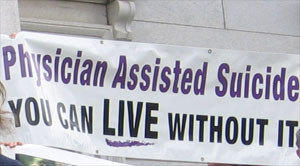The No On Question 2 committee, which is leading the campaign against the ballot proposal to legalize assisted suicide in Massachusetts, has released its first web video showing the dangers that could result.
The No on 2 video highlights the myth that Oregon’s experience with legal assisted suicide is free from problems. It features 2008 footage of Oregon cancer patient Barbara Wagner, who was denied by her health provider cancer treatment approved by her doctor. The state offered assisted suicide drugs instead.
Wagner found out in that her lung cancer, in remission for about two years, was back. After her oncologist prescribed a cancer drug that could slow the cancer growth and extend her life, Wagner was notified that the Oregon Health Plan wouldn’t cover it. It would cover comfort and care, including, if she chose, assisted suicide.
Wagner recorded an ad for the group opposing the Washington assisted suicide measure urging voters to reject I-1000, though that state became the second to allow the practice.
 “My first reaction when I found out that I had lung cancer was fear,” Wagner explained in that ad. “The doctor was hopeful and has something he really wanted to try me on,” Wagner says. “Unfortunately, they were unable to approve the request.”
“My first reaction when I found out that I had lung cancer was fear,” Wagner explained in that ad. “The doctor was hopeful and has something he really wanted to try me on,” Wagner says. “Unfortunately, they were unable to approve the request.”
“They would pay to kill me but would not pay to give me the medication to try to stop the growth of my cancer. People of Washington, don’t vote this in,” she concluded.
Like the Oregon law, Massachusetts Ballot Question 2 has no safeguard against the type of issue faced by Barbara Wagner in Oregon.
Marilyn Golden, a national disability rights advocate and policy analyst for the Disability Rights Education & Defense Fund notes, “Ballot Question 2 has profound policy implications for the people of Massachusetts. As a progressive and person living with a disability I urge voters to look at this proposal carefully.
CLICK LIKE IF YOU’RE PRO-LIFE!
“We need to protect vulnerable patients who would be at risk of being pressured to choose death by a lethal prescription. That pressure could come from an insurance company or health care provider that doesn’t want to pay a treatment or a family member who stands to gain from the patient’s death,” Golden said. “Barbara Wagner’s story in Oregon tells us about the lack of safeguards and problems arising from this proposed law.”
Get the facts about Ballot Question 2 and what it means for Massachusetts by going to www.NoOnQuestion2.org








